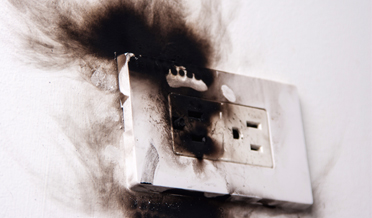How To Prevent Electrical Fires
Prevent Electrical Fires in Your Home
Each year our lives revolve around more and more devices that use electricity and the use of electricity is up nationwide. Tragically, in 2019 almost 50,000 US homes experienced electrical fires resulting in 500 deaths and over $1B in property damage.
More tragic still, with some common-sense precautions, most of these electrical fires were preventable.
The average home has 50 devices plugged into wall outlets—take a walk through your home to see if that describes your situation. After becoming familiar with your home’s electrical use, consider these 7 things that can prevent the most common mistakes that lead to residential electrical fires.
- Use Power Strips and Extension Cords Properly
Appliances and devices that draw a lot of power should be plugged into an outlet, not an extension cord of any kind.
Appliances that should not use extension cords include microwaves, refrigerators, freezers, and coffee makers in the kitchen, hairdryers, and irons (either curling or flattening) in bathrooms, space heaters, and portable AC units in any room.
Power strips are extension cords and so are multi-device charging stations. Do not overload power strips—two devices are recommended. To prevent electrical fires never “daisy chain” power strips.
- Use Outlets Properly to Prevent Electrical Fires
Outlets are designed to carry a certain amount of power, usually 15 or 20 amps in residential settings. Overloading an outlet is just as dangerous as loading an extension cord. The outlet that handles major appliances that draw a large energy load (such as a freezer) should have only one appliance plugged into the outlet.
It should stand alone, without extension cords or other appliances using the same outlet. This is one of the most common mistakes leading to electrical fires. Now that you know, wisely remove such devices from those outlets. If you have no other available outlet, it may be time to add outlets to accommodate the needed devices.
- Unplug Unused Devices to Prevent Electrical Fires
Many appliances are designed to remain under power constantly, such as refrigerators, freezers, and clocks. Other devices are using power—you see the indicator light—even when not in use and there is no benefit to keeping them connected.
These gadgets can be disconnected, either by unplugging them or turning off the power strip. Device chargers are an example. Why keep them under power when not in use? Always unplug devices in the bathroom when not in use.
Small appliances in the kitchen, such as toasters and blenders can be unplugged. Often computers and printers can be disconnected while not in use. Getting into the habit of disconnecting can reduce the potential for damaging house fires.
- Cautions Concerning Space Heaters
Space heaters and electric blankets draw a lot of power and are leading causes of residential electrical fires, deserving special attention. First, unplug space heaters and electric blankets when not in us. Second, do not leave them operating without anyone at home.
Third, use a space heater at full power until the room is the desired temperature, then reduce to ½ power. You will stay warm without risking damage to the outlet or tripping the breaker.
- Cautions Concerning Older Appliances
The cost of replacing appliances can be a major financial decision, so it is prudent to make them last as long as possible. However, keeping appliances longer than you should is not wise.
Worn appliances may cost more to run, and worn appliances that malfunction becomes a safety hazard that should be replaced. Things to look for include:
- Frayed electrical cords or loose connections
- Excessive heat from electrical components
- Sparks at any stage of operation
- Lights flicker when it engages
Appliances that exhibit these symptoms increase the chances of an electrical house fire.
- Create Space Around Electrical Outlets to Prevent Electrical Fires
For various reasons, electrical outlets can generate sparks or heat that can lead to a fire, especially outlets that are overloaded or faulty. Because we try to maximize space, it is common to place furniture, drapes, or other items directly in front of outlets.
Take care not to pinch or bend power cords connected to outlets and give outlets room as much as possible. Regularly put a hand close to outlets to check for heat. If an outlet is warm to the touch, repairs are in order.
- Inspect Your Electrical System Regularly
Homeowners are encouraged to conduct preventative functions regularly—change air filters and fire alarm batteries, for example. Regularly take a walk through your house and consider these safety precautions and make adjustments.
Include family members, so that everyone is involved, including unplugging or disconnecting unused devices and keeping furniture away from outlets.
If you have any questions or concerns an electrical safety inspection by your professional electrical contractor would give you peace of mind.
A contractor has diagnostic tools and a wealth of experience; his or her inspection will thoroughly examine the electrical panel, wiring, and circuit capacity to determine potential problems.
Have Questions on How to Prevent Electrical Fires
Our four decades of experience as a Houston Electrician and contractor AirPro Houston provides you with the skill and expertise to prevent electrical fires.
We have financing options available with great options with up to 72-month terms with approved credit. Call us today at 281-880-8805 and let us partner with you for all of your electrical repair and installation needs.

